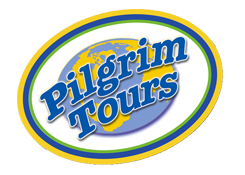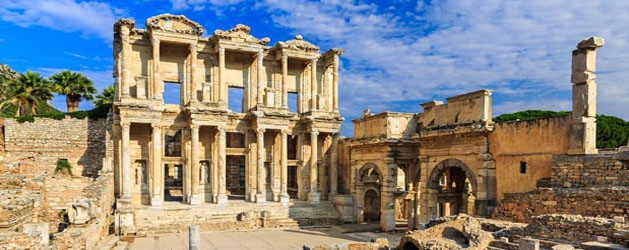

Click on the tabs for more information
Price Per person double occupancy
| Dates |
|---|
| Request a quote or call 800-322-0788 for more information. |
|
Ask About Special Rates for Pastors, Christian Educators, & Custom Groups of All Sizes. No Obligation Group Quotation - Click Here |
Price Includes: First class (4 Star) lodging, breakfast and dinner daily, modern transportation, sightseeing as listed.
Not Included: Flight departures (low cost fares available nationwide), fuel charges, air taxes, travel/cancellation insurance, Turkey visa fee (U.S. $30.00 / Canada $60.00 USD) See information below.
Please Note: Turkey Entry Visas* must be secured in advance prior to arrival. Visas can be obtained in advance online at the link below.
*Turkey “E-Visa” online purchase - Click Here
Airport transfers are included only when airfare is purchased from Pilgrim Tours. Taxi service is available for those purchasing their airfare elsewhere.
Deposit Required: $300 per person will reserve your place. A $100 service fee will be charged for cancellation at any time in addition to our normal payment and cancellation policy.
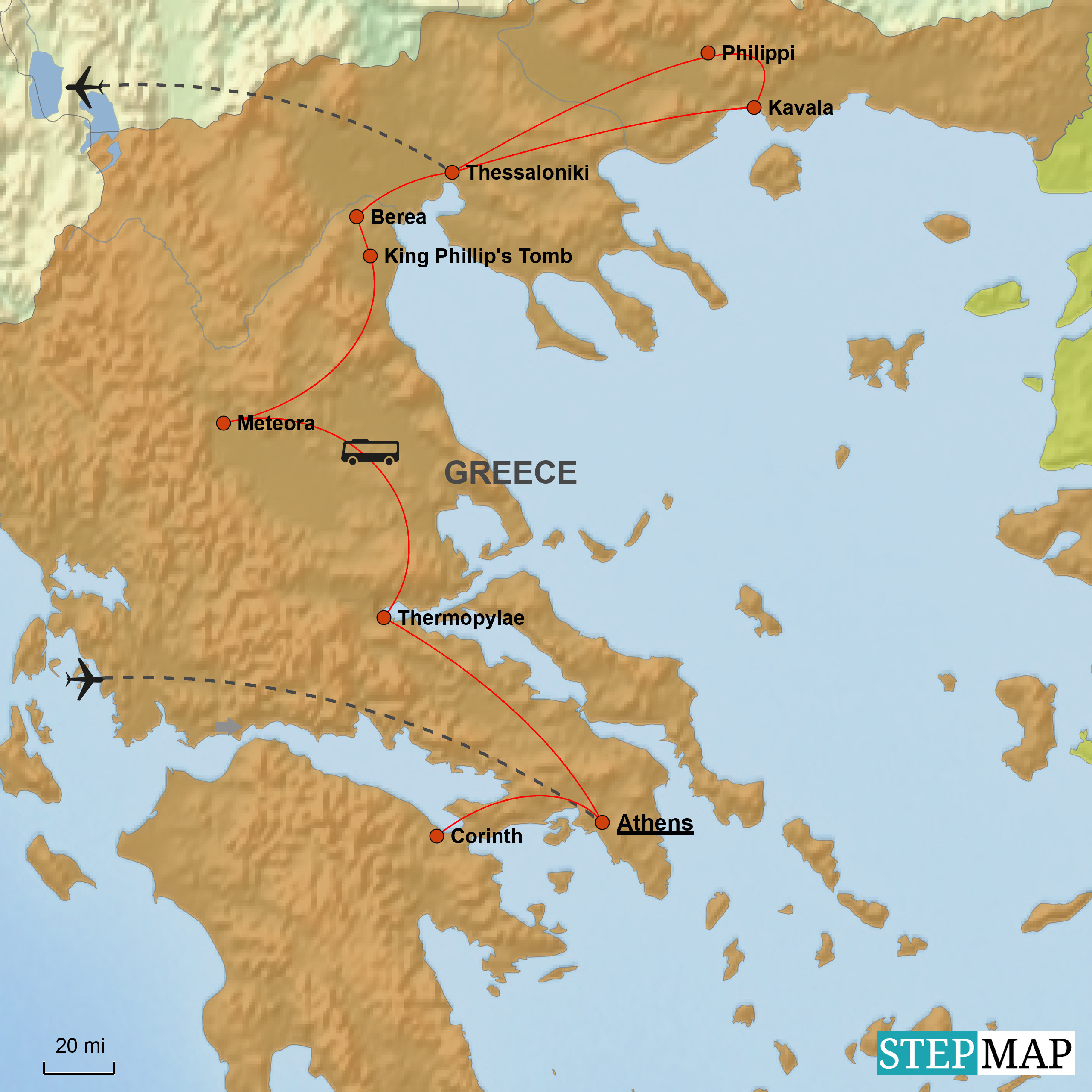
Day 1: Departure from US
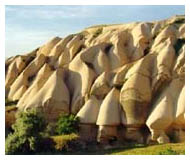
Today we embark on our Journey to the lands of ancient treasures and Christian history with an overnight flight to Turkey. Prepare yourself for a life-changing experience. Get some rest on the flight…Tomorrow you will be walking where the apostles walked!
Day 2: Arrive Turkey, Cappadocia
Arriving in Kayseri, we transfer to our lodging for the next two evenings, where the remainder of the day is free for you to relax and enjoy a leisurely dinner.
Day 3: Cappadocia
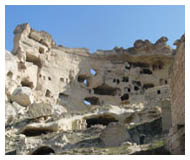
We spend all day exploring the history and scenery of Cappadocia. First off, we’ll visit the gently folding volcanic rock formations and “fairy chimneys” of Goreme Open Air Museum. These rock formations are not only beautiful, but functional as well. Many early Christian communities lived and worshipped deep in the rocks and crags, leaving their frescoes and paintings to be marveled at centuries later. Other communities lived underground, and we’ll visit these dwellings too. To protect themselves from Roman persecution and marauding bandits, local people began to live in underground caves forming “cities” that reach a depth of up to 7 stories below the surface. Other sites include the Natural Citadel of Uchisar and the small, picturesque village of Avanos – famous for their red clay pottery. In Avanos we’ll visit “The Potter’s Place: Gift Shoppe and Cultural Center” and have time for visiting local potter for a demonstration and maybe try your own hand at the potter’s wheel.
Day 4: Cappadocia / Caravanserai/ Lystra / Konya
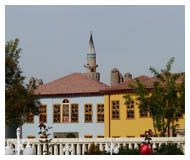
Travelling westward, we stop at the Sultanhani Caravanserai just like travelers from Turkey’s bygone era. Founded for military and trade purposes, the Caravanserai’s Inn was built along the east-west trade route. We will have lunch near Konya, followed by an afternoon visit to Lystra, where Paul preached on his first missionary journey (Acts 14: 6-22). Our lodging this evening will be in Konya (ancient Iconium) included in Paul's first missionary journey. Nearly two thousand years ago, Paul and Barnabas visited Iconium during Paul’s first missionary journey. As he preached to the city, God used Paul to bring many Jews and Gentiles to Christ (Acts 14: 1-6). We will also visit the excavations of Catalhoyuk before transferring to our lodging for the next two nights in Konya.
Day 5: Pisidian Antioch / Mevlana Mausoleum
Konya is also the home of the Mystic sect of the spectral Whirling Dervishes. We’ll have an opportunity to learn more about this mysterious order when we visit the museum of its founder, Mevlana, who is also known as the poet Rumi. We will continue to Pisidian Antioch – one of important stops on Paul’s missionary journeys. Although only 10% of Pisidian Antioch has been excavated, the ruins from the Roman period are noteworthy. We’ll see Septimus Severus’ triumphal gate, Augustus’ Temple, the Roman baths, a theater and a church dedicated to Paul.
Day 6: Coastal Mountains / Perge / Antalya Harbour

Our route this morning through the coastal mountains will bring new understanding of the rugged terrain that Paul traveled on his missionary journeys in route to the bustling, palm-lined streets of Antalya. Founded on the “Turquoise Coast” of the Mediterranean, Antalya has boasted a mild climate and beautiful beaches and harbors for centuries. In fact, Paul and Barnabas sailed from Antalya harbor in the 1st Century on the first missionary journey. Today, we’ll visit the best preserved Roman Theatre in the world in Aspendus and the neighboring town of Perge. It was in Perge that John Mark decided to part company with Paul and Barnabas, while they continued on their missionary journey. Ruins of the city’s streets, baths, gates and theater are still visible. We also visit historic Attalia Harbour and Hadrian’s Gate. We spend one evening in Antalya.
Day 7: Demre (Myra)
After breakfast, we’ll depart Antalya for a leisurely trip along the beautiful coastline to Demre (ancient Myra) to visit the 11th Century Church of St. Nicholas. The church was built to commemorate an early Christian bishop who was present at the First Ecumenical Council and eventually became known as Santa Claus. It is interesting to hear our guide speak of how time has turned this early church father into a mythical hero. To view the red and white statue of Santa Claus standing in the square, see the Muslim vendors peddling statues (idols to their thinking) and hear the call to prayer from the nearby mosque is strangely bizarre. In Myra we will also visit the port where Paul and Luke changed ships en route to Rome. As the Myra of today is the sailing center of the Anatolia region, It is very interesting to see the many wooden boats lined up as it would have been in Paul's day. Following free time for lunch, we continue northward to our lodging for the next two nights in the spa village of Pamukkale.
Day 8: Hierapolis, Colossae & Laodicea

Hierapolis, meaning "Sacred City," was an ancient center for pagan cults until it was transformed into a Christian center in the first century. According to tradition, the Apostle Philip lived and was martyred in Hierapolis. It was the likely the hot springs of Hierapolis in contrast to the cold mountain springs near Colossae that combined to bring application to the "luke warm" Laodiceans. (Rev 3:14-22) This connection between the cities lies behind Paul’s reference to Hierapolis and Laodicea in his epistle to the Colossians (Col 4:13). Colossae is well-known throughout Christian circles as the receiver of Paul's letter to the Colossians. Today, the town has fallen into obscurity and nothing remains. Laodicea contains many acres of ruins to visit including a stadium and remnants of a sophisticated water system.
Day 9: Philadelphia, Sardis, Thyatira, Smyrna

Philadelphia was referred to as the "New Jerusalem" (Rev. 3:7-13) in the Book of Revelation, yet today, not much is left of the city except for the ancient wall and the remains of a Byzantine basilica in the modern city of Alasehir. Sardis was berated by John for its facade of strength when in reality; it was weak (Rev. 3:1-6). Here coins were minted and the dyeing of wood originated. We'll visit the gymnasium and synagogue. A stop will be made in Thyatira to view the ancient roadway and period columns. Izmir is the third largest city in Turkey and a long time center for Jews and Christians. In Paul's day, Izmir was known as Smyrna and was another of the Seven Churches (Rev. 2:8-11). Here we'll see Polycarp's Church and the ancient agora. Our lodging the next three evenings will be in Izmir.
Day 10: Ephesus

This morning we visit the Church of St. John for a tour and a scenic overview of the Ephesus area. From here our guide will point out the location of the ancient harbor of Ephesus and describe the silting process that led to the demise of this important Roman city. Of special interest is the tomb of John and the baptismal where new believers were immersed. We will also be able to view the site of the ancient wonder - the Temple of Artemis and the nearby Mosque of Jesus (Jesus is a respected prophet to Muslims). This afternoon we’ll view a wealth of artifacts awaiting us at the Museum of Ephesus and visit the archeological site of Biblical Ephesus, which hosts a large restoration effort and miles of ancient treasures. Ephesus was once a thriving port town of 250,000 people. Today you can still see the spectacular excavations of the major streets in this ancient city where we view the Library, Agora, Temple of Artemis, theatre, colorful mosaics, a panoramic view of the surrounding ancient port area including a wealth of church history and cultural insight. The day will not be complete without a visit to a local Turkish Rug cooperative.
Day 11: Pergamum, Free Time

Once a busy trading center and famous as a "seller of purple," the most favored of the Seven Churches, the church of Pergamum was praised for its forbearance (Rev. 2:12-17). It was here that the first Christians were executed by Rome. We'll visit the fabled Acropolis, pass through the Royal Gates, view the foundations of the Temple of Zeus and visit the ruins of the library, which once held 200,000 volumes. We return to Izmir and enjoy free time for last minute shopping and relaxing in this lovely city.
Day 12: Home
This morning we transfer to the airport for our flight to the USA.
*The tour itinerary is subject to change or be slightly modified in order to best meet the interests of the group.

